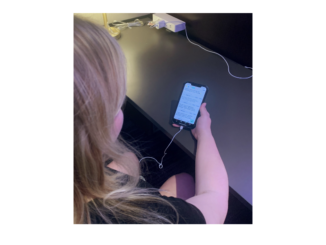
When COVID-19 upended the fall semester, incoming transfer student Venus Taillant didn’t have the luxury of taking a semester off.
Like many transfer students, Taillant had already completed all of the GEs that would easily transfer, and she was eager to move forward with her education and career. She graduated high school early at 17, earned her real estate license at 18 and attended the College of Marin in the Bay Area for three years.
She decided to transfer to Pepperdine because she wanted to gain a greater understanding of marketing and gain exposure to the Malibu market — her target clientele for her full time job with the real estate team, Welcome Home SF.
“I’m coming for the education, I really want to learn, and I feel like I’m not learning as much as I would in a classroom even though a lot of them are trying,” said Taillant, a junior integrated marketing communication major. “It’s just not the same. It’s hard to stay engaged, it’s hard to figure out what’s going on.”
With two-year public institutions becoming more popular as the best financial route for many students, universities are working harder to create a supportive and comforting environment for their transfers. Many students who decide to transfer to four-year institutions face unique challenges that incoming freshmen don’t. Challenges like transferring credits, getting to know people in an environment where everybody already knows each other, and just being older than other students.
Being online forces transfer students to struggle, but adapt
Andrea Harris, senior director of Student Administrative Services, said many incoming transfers opted to stay, and that the gravitas and maturity that is typical of transfer students allowed those who opted to stay to adapt, move forward and stay sustained.
With the online format, experiences have varied from student to student and although there are some positives to being online, students seem to still be struggling. Taillant said she feels like classes are more intimate and interactive with private chatting in Zoom and with professors getting creative with their activities. But it can still be hard to stay engaged.
“You need to be your own fire under your butt,” Taillant said.
Coming from the College of the Canyons, Diamond Longs, a junior business communication major, said she has wanted to attend Pepperdine for a while because of how well her values match the institution’s. She said she would have transferred to a cheaper school if she had known earlier that Pepperdine was going completely online, but she feels like God has blessed her with the connections and opportunities.
“I feel like I’m where I’m supposed to be and God definitely said you’re gonna be molded real quick and it’s gonna hurt and you’re gonna be refined, but there’s always purpose,” Longs said.
Longs thinks the workload has been very hectic. As an aspiring musician with music on Apple Music and Spotify, her faith has been crucial to sustaining her as she strives to make the most of this semester online. It’s been even harder for her as she lost her grandma to COVID-19.
Junior chemistry major Daniel Chen, a fellow College of the Canyons transfer, said he battled with whether doing online courses was worth the financial cost.
“I feel like I put in a lot of work into just getting into Pepperdine just because I tried to cram two years into one at a community college so I took a lot of units and I made sure my grades were high enough and for all of it turn like this felt like a slap to the face,” Chen said.
So far though, he said that some of his professors are super accommodating.
Counting the costs transfer students face
From COVID-19, the mode of teaching at universities has varied, which have influenced students all across the United States. By Sept. 9, 44% of higher education institutions decided to go fully online this semester, which leaves about 28% in person and 21% doing hybrid models, according to the The College Crisis Initiative at Davidson College in North Carolina.
As one of the schools that went completely online, Pepperdine’s decision to be remote made students rethink their decisions to attend.
“I feel like, if I would’ve known, well it depends, I think Pepperdine is a really great school and I was going to go here anyways,” Longs said. “But I think financially if I had known we were going to be online, because they told us like one week before school like oh that was last minute.”
With rising college tuition and even more college debt, some students are doubting whether a college degree is worth the time and money. As a private university, a Pepperdine degree is expensive and can create a lot of debt for many students.
Research shows that only 8.1% of 752,025 community college students surveyed complete their degree at a four-year institution over a six-year period, according to the National Student Clearinghouse Research Center.
For many students coming out of high school, private universities are not financially realistic and not the best fiscal route. That is why students like Chen, who originally got into Pepperdine his senior year, decided to go to a community college first before transferring.
Pepperdine administrators adjust to the times and their students
While Pepperdine faculty have made an effort to create community within their classrooms, transfer administrators have also become more creative to address the emerging needs of transfer students.
To make it easier for transfer students going online, OneStop advisors have accepted more units than typical from students transferring, including more humanities credits, Harris said. Chen, Longs and Taillant all said their desired credits transferred.
“We are trying our best to be, to have grace and to support our students and not give them more problems than they already have,” Harris said.
Transfer advisors are working to build an online community among transfer students. Stacy Montgomery, associate dean of Student Affairs for Transfers and Commuter Students, and Sergio Gallardo, Student Affairs intern for Transfer and Commuter Students, have created Instagram challenges/giveaways every Thursday. This replaced their normal in-person program,Transfer Breakaways, a weekly meal where transfer students would just interact with one another.
With such a different context, Gallardo said, programming for the year has shifted from the normal logistics. Major events like New Student Orientation had to be moved to online due to COVID-19.
“Now it’s trying to find creative ways to get people engaged and try to encourage fellowship among transfer students within an online context,” Gallardo said.
Montgomery and her team are trying to be more intentional. When students do have the opportunity to connect, they are trying to truly maximize those virtual connections.
For example, they regularly place transfers into family groups with transfer mentors, current students who had previously transferred and have knowledge and advice to give and share. This year, they have revamped those to a virtual format. These ‘family groups’ provide a space for new transfer students to ask questions and build relationships.
“We’re trying to just create pockets of community where either myself or Sergio or the transfer mentors are accessible as resources,” Montgomery said.
Fellow transfers aren’t necessarily connecting with each other, but still finding connections
Of the three students interviewed, only Taillant is making use of the transfer families opportunity. But her main connections so far have come from going Greek and joining Alpha Phi.
“For me, rushing was the first time I got to meet girls and hear their lives and just add real people’s stories behind Pepperdine,” Taillant said.
In this first semester, Chen’s biggest obstacle has been trying to get to know new people, especially because of the barrier of being online. Yet he doesn’t regret sticking with Pepperdine because he already knew some people and because of the few new people he has been able to meet.
“I think the most important thing would be to make sure you get connected with someone at the school you’re transferring to,” Chen said. “Because when you transfer in, if you don’t know anyone it can be really lonely.”
Longs said she has pushed herself out of her comfort zone and has joined the Alpha Omega student-led ministry, the Step Team, Word Up and the Black Student Union. She still appreciates how the transfer staff are trying their best to make new transfer students feel at home.
“Being a transfer student, I think people should know that it is harder to make or fit into something where everybody already knows each other,” Longs said. “So I feel like others should be trying to go out of your way to get to know transfer students.”
Serena Woon completed the reporting for this story under the supervision of Dr. Christina Littlefield and Dr. Elizabeth Smith in Jour 241 in Fall 2020. Dr. Littlefield supervised the web story.



